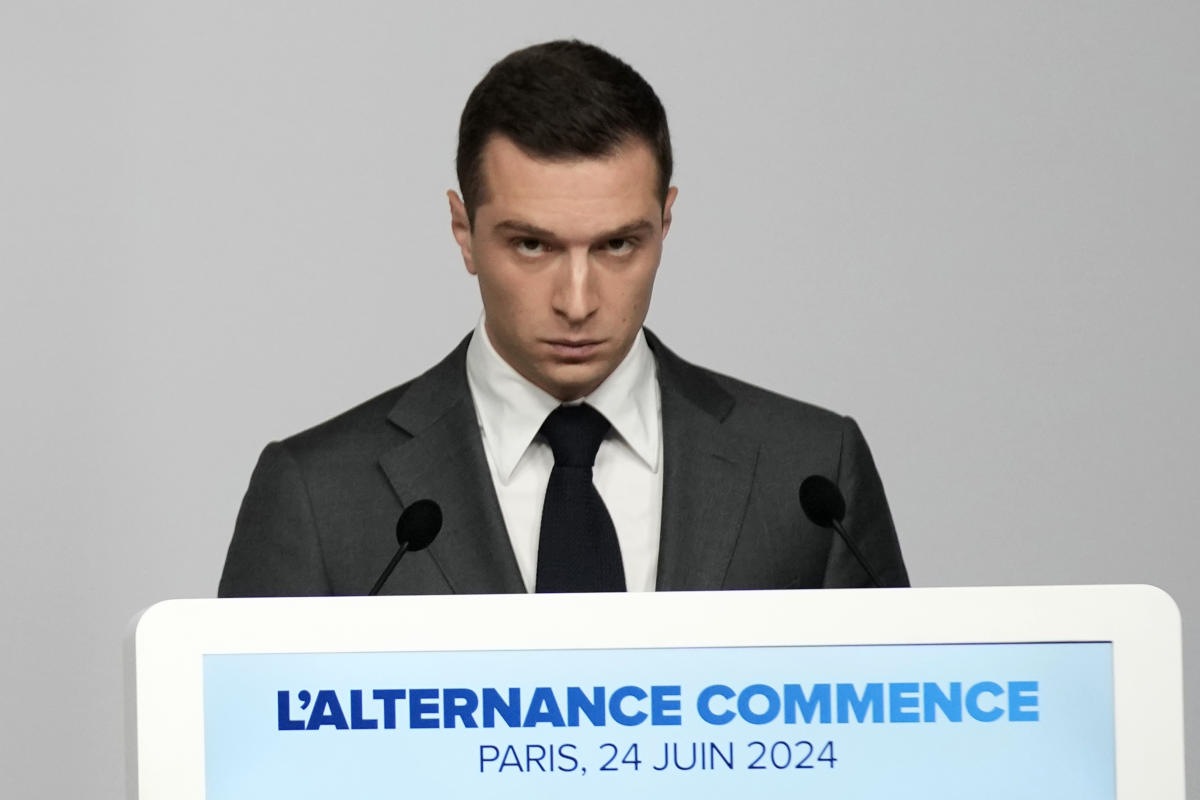PARIS (AP) — Far-right leader Jordan Bardella sought to reassure French voters, European partners and international observers on Monday that his potential government would lead “realistic” economic policies and “not weaken” France’s voice abroad, if his party wins the upcoming parliamentary election.
Bardella, who could become prime minister if voters choose a majority of his National Rally party’s candidates in the two-round parliamentary election on June 30 and July 7, unveiled his program at a news conference.
Polls show that the outcome of the early election, called by President Emmanuel Macron after his centrist alliance suffered a major defeat in this month’s European Parliament election, remains highly uncertain. Macron is aligned against both the National Rally and the New Popular Front, a coalition of far- to center-left parties.
Dressed in a crisp gray suit and black tie, Bardella was notably affable, smiley and poised. He was seeking to project himself as a polished potential national leader despite his complete lack of experience in government and his age – which, at 28, would make him by far France’s youngest-ever prime minister.
He vowed to implement “realistic, credible” economic policies amid European Union criticism about France’s excessive debt.
“The country’s worsening budgetary situation, with 300 billion (euros) in additional debt in the past two years and record public and trade deficits, must be taken into account,” he said.
Bardella promised to “defend purchasing power” by cutting taxes on fuel, gas and electricity. He also promised tax cuts for companies, if they increase their low- and medium-paid employees’ wages by up to 10%.
He pledged to roll back Macron’s pension changes that raised the retirement age last year to 64, and put it back to 62 — on the condition that people work for at least 42 years.
Bardella sought to counter concerns that his party’s campaign pledges may require many tens of billions in state financing to realize. He said he would finance the measures by cutting on “expenses that encourage legal and illegal immigration” and closing some “tax loopholes.”
A 21-page pamphlet of pledges that the National Rally released didn’t cost out its plans. Bardella said that one of his first steps as prime minister would be to order an audit of France’s finances, meant to give him a better idea of how measures could be financed.
Bardella also has redoubled his party’s efforts to counter critics’ allegations that it has long been friendly toward Russia and President Vladimir Putin. He repeated that he regards Russia as “a multidimensional threat both for France and Europe,” and said he would be “extremely vigilant” of any Russian attempts to interfere with French interests. He said that he supports continued deliveries of French weaponry to Ukraine to enable it to defend itself.
Yet his approach to Moscow appeared much more accommodating than Macron’s stance.
Bardella said that he opposes sending French troops to Ukraine, and French deliveries of long-range missiles and other weaponry capable of striking targets within Russia itself. He called those “my red lines.”
In Europe, “our arrival in office will also mark France’s return to the European stage to defend its interests,” Bardella said, explaining that he was willing to negotiate “exceptions” to EU rules.
He laughed and smiled when asked whether, if he becomes prime minister, he would deliver speeches with an EU flag in the background. “I’m thinking about it,” he said. Bardella’s campaign for the European Parliament election featured the French flag only, not the EU one.
In response to German Chancellor Olaf Scholz saying that he’s worried about the upcoming French election, Bardella calmly acknowledged “it’s normal for him to express political reservations about us,” because he is ”a political rival.” Scholz, who belongs to the center-left Social Democrats, said that he’s hoping the far right won’t win Sunday in an interview with German public broadcaster ARD.
As prime minister, “of course, I’d be willing to talk to all (European) heads of government… and I hope to get the opportunity to talk to the German chancellor,” Bardella said.
At home, he said that promoting law and order and tighter regulation of migration would be his immediate priorities, in line with the party’s favorite themes.
He said that dual nationals would be barred from some specific key jobs as state employees in the defense and security field.
Bardella promised “a big bang of authority” for schools, detailing plans to create special centers to educate disruptive pupils. He said that cellphones would also be banned for pupils starting from the new academic year in September, including in high schools, and students would be obliged to address teachers as “vous” – the more formal way in French of saying “you” — rather than “tu.”
Bardella also played up another long-term campaign strategy of the National Rally, arguing that France is a country in dangerous decline and that the party would bring a firm hand to help it regain its standing, strength and influence.
“I want now to address myself to all those French people whose hearts are bleeding as they look at the state of the country,” he said.
But he also sought to reassure voters terrified at the prospect of France installing its first far-right government since its Nazi occupation in World War II. In power, the National Rally wouldn’t curtail individual rights and would be the guarantor of absolute respect for the rights of opposition parties “because pluralism is a formidable wealth, as are freedom of expression and the circulation of ideas,” he said.
___
Stephanie Liechtenstein contributed to the story from Berlin.

